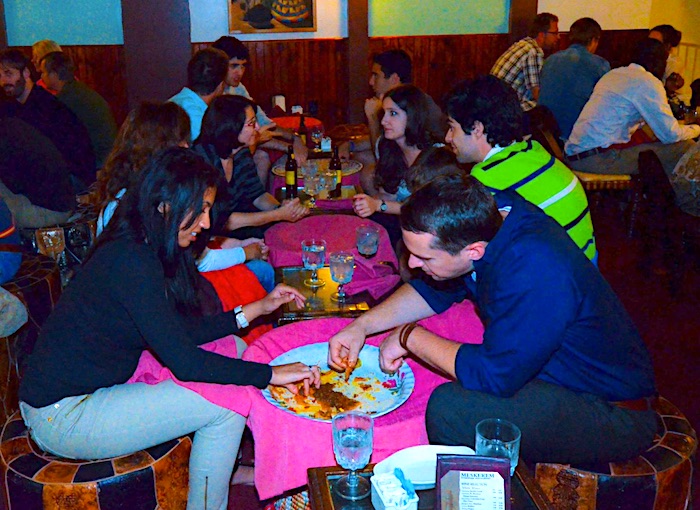When Meskerem opened on March 15, 1985, there wasn’t much of Ethiopia in D.C. Its owners were amongst the first wave of immigrants who fled their homeland after a Marxist military junta overthrew Emperor Haile Selassie in 1974.1 That coup triggered the civil war between Ethiopia and Eritrea that lasted until 2000 with the final peace agreement not being signed until 2018.
Both Ethiopian and Eritrean refugees settled down near the Adams Morgan neighborhood in D.C., a culturally diverse neighborhood known for its eclectic dining scene. The name AdMo is derived from two formerly segregated elementary schools and when the sun goes down, the laid-back 18th St transformed into a mile-long party zone.
The popularity and vibrant nightlife led to higher rent prices so a lot of the Ethiopian entrepreneurs moved out purchasing dilapidated properties on U and 9th Sts NW that were devastated by the 1968 riots following Martin Luther King Jr’s assassination.
Eventually, the number of Ethiopian eateries got so dense on 9th St that several community leaders petitioned the D.C. government to rename the block “Little Ethiopia.” That petition was overruled since its location in Shaw was near Howard Theater and doing so would replace the “Black Broadway” moniker.
There’s always a lot of excitement in AdMo. On weekend nights, hoards of party-goers can be seen getting drunk and boisterous, raising a ruckus into the early morning.
On Sunday, Sept 29, 2008, a man walked into Meskerem, greeted the owner, Mohaba Mohammed, with a hug, and then started chatting. Everything seemed normal between the longtime friends. Suddenly and without provocation, the man took out his Beretta and then shot Mohaba in the neck. 2
“Everybody don’t worry!” He yelled, then fired two shots into the ceiling before shooting himself in the head.
Mohaba recovered from his injuries, and through the years, he and his sister, Nafisa Said kept the restaurant running, through the good times and hard, even as others around them closed. They did that for 3o years, eventually becoming the oldest Ethiopian restaurant in the US — instrumental in shaping the personality of Adams Morgan into the vast melting pot that it is today.
Supplies used to be tough to come by. Mohammed could not find any teff, an Ethiopian grain used to make injera. So he used wheat flour and let the dough ferment for days in plastic buckets. Today, Ethiopian Airlines flies daily to D.C. carrying injera, teff, spices, and much more.
So when Jackie invited me to join her for a Sept 2014 Ethiopian dinner at Meskerem, I was delighted to attend. There was a fairly large group of diners who were mostly Ethiopian cuisine neophytes. We didn’t sit on elegant wooden chairs or eat from pristine table tops. We were seated instead on traditional cushioned low chairs next to knee-high round tables made out of basket weave.
Jackie Woodbury, Sept 25, 2014
Join me tomorrow night for our Ethiopian dinner at Meskerem in Adams Morgan!
Did you know Ethiopian New Year was Sept 11? Celebrate Meskerem, the name for the first month of the Ethiopian calendar. It ends the 3 month rainy season in Ethiopia (Jun-Aug) and celebrates more pleasant weather! We asked owners Mohaba and Nafisa to bring back their coffee ceremony for Bookalokal Inc.. Can’t wait! D.C. #DCeats #dcdining
Most of our group ordered the Meskerem Messob — mixed special which included beef, chicken, lamb, veggies, and unlimited injera all for $13.50 per person. A few ordered the veggie-only version. The dishes were anything but boring. The healthy portions included ruby beets, lentils, salad, carrots, green beans, and chickpeas and were flavored with garlic, paprika, and rosemary. The platter was fairly big and it was meant to be shared with others at your table.
Sharing with others meant teamwork, better conversation, and synergy. We enjoyed our spicy palette of delicious curry-like stews accompanied by honey wine or St George, the national beer of Ethiopia.
The soft, stretchy, spongy flatbread doubled as an eating utensil and the hands still get plenty messy.
“Is this the messiest you’ve ever gotten eating with your hands?” I asked my friend Yoomie Huynh.
“Close, but not quite. The messiest I’ve ever gotten was at the Ben’s Chili Bowl half smoke eating contest during the H Street Festival. I didn’t win, but I ate everything in sight.”
Jackie enjoyed working with Mohaba and Nafisa in organizing the event.
“It brought lots of people from all different nationalities together to share a meal, a chat, and a smile,” she said. “Ethiopian cuisine is very communal.”
I am forever awed by the resourcefulness and resiliency of the Ethiopian people. Just like Tadiwos Belete from Boston Spa, the owners of Meskerem were innovative and resourceful in building their business and keeping it running despite limitations and setbacks.
Less than a year later, Meskerem — after being opened every day since March 15, 1985, suddenly closed. The owners held down the fort and watched as one after another, Ethiopian eateries closed or relocated to U St or the burbs in Maryland and Northern Virginia. And after 30 years, they decided to sell the property to developers and retire from the limelight.
And with that according to Tim Carman, food reporter at the Washington Post, “the neighborhood’s connection to that first wave of war-weary immigrants appears to be severed forever.”

* * *
1 Carman, Tim. “R.I.P., Meskerem: The Ethiopian restaurant that shaped Adams Morgan”, May 4, 2016
2 “Manager of Meskerem Restaurant in D.C. shot, wounded”, Ethiopian Review, September 30, 2008